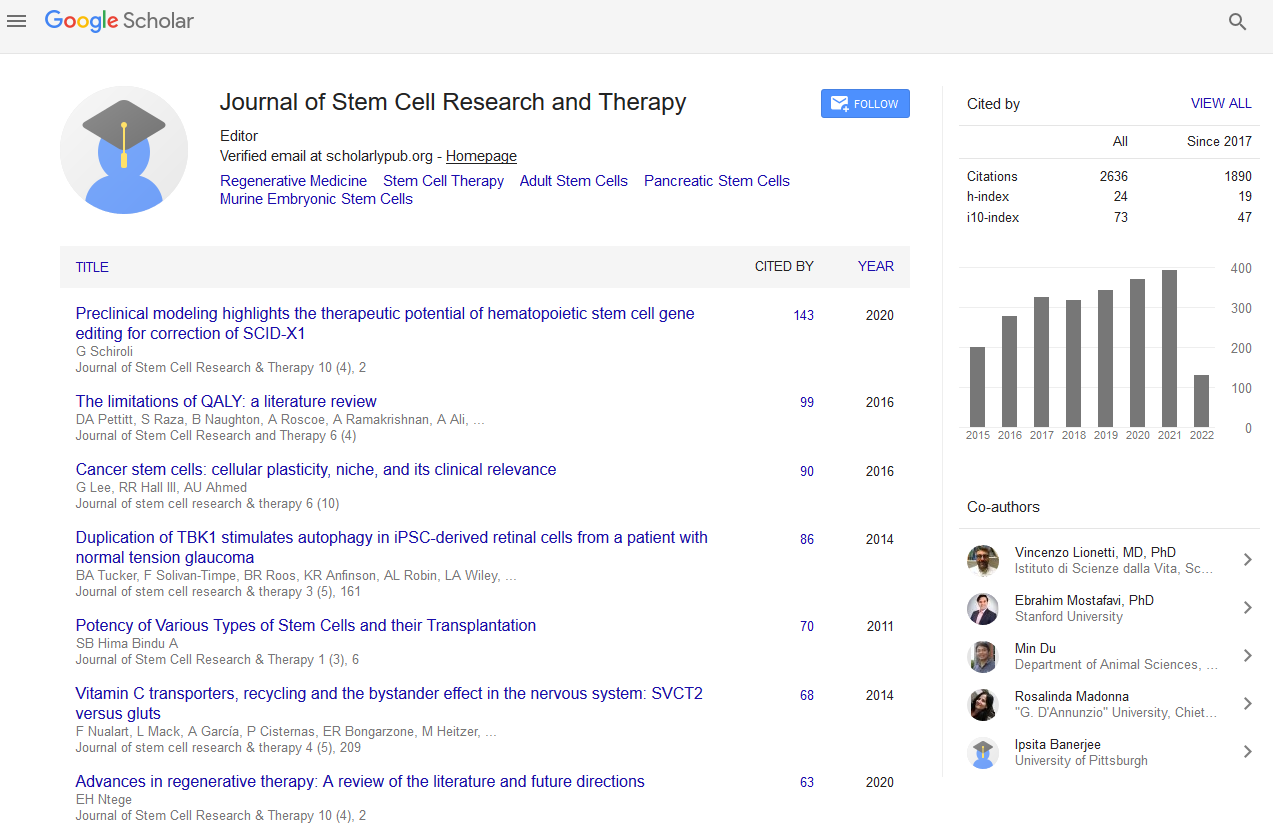Indexed In
- Open J Gate
- Genamics JournalSeek
- Academic Keys
- JournalTOCs
- China National Knowledge Infrastructure (CNKI)
- Ulrich's Periodicals Directory
- RefSeek
- Hamdard University
- EBSCO A-Z
- Directory of Abstract Indexing for Journals
- OCLC- WorldCat
- Publons
- Geneva Foundation for Medical Education and Research
- Euro Pub
- Google Scholar
Useful Links
Share This Page
Journal Flyer

Open Access Journals
- Agri and Aquaculture
- Biochemistry
- Bioinformatics & Systems Biology
- Business & Management
- Chemistry
- Clinical Sciences
- Engineering
- Food & Nutrition
- General Science
- Genetics & Molecular Biology
- Immunology & Microbiology
- Medical Sciences
- Neuroscience & Psychology
- Nursing & Health Care
- Pharmaceutical Sciences
Abstract
Human Peripheral Blood Stem Cells can be a Solution to Diabetes Mellitus Type 2 a Preliminary Study on 14 Patients
Ciro Gargiulo, Van H Pham, Huynh D Thao, Vo LH Trieu, Nguyen CD Kieu, Melvin Shiffman, Mark J Holtherman and Sergey K Aityan
Background: The use of autologous peripheral stem cell (PB-SCs) in Diabetes Mellitus type 1 (type 1 DM) was described in 2007 with promising conclusion. However a similar treatment with a positive outcome on type 2 diabetes mellitus patients (type 2 DM) has not been yet reported. The goal of this study was to determine the effect of autologous PB-SCs transplantation in treatment of DM2 patient. Methods: Current study involved 14 patients with type 2 DM (aged 48 to 84 years) during a period of 180 days in our facility. Clinical variables (duration of DM, oral hypoglycemic drugs, time free from oral drugs) and laboratory variables (HbA1c, blood pressure, weight, cholesterol), mononuclear cells infused were assessed. Purified PB SCs were infused into major systemic vein (upper limbs or lower limbs) and subcutaneously in the abdomen. Follow-up is performed weekly after infusion during a period of 6 months. Results: Mean HbA1c values showed a significant reduction during follow-up in all patients after autologous PB-SCs. After the treatment with stem cells the HbA1c level dropped by at least one unit relative to the HbA1c level in the medication phase, with stem cells patients have mean value of HbA1c lower than 6.5% (Mean value at time of diagnose 8.9%, at time of medication 7.9% and at time of post stem cell therapy 6.2%). Also, it was confirmed that the stem cell treatment is more efficient for the patients with higher HbA1c level in the medication phase and the level originally diagnosed. In 180 days after the combined therapy, HbA1c, cholesterol, and liver profile stay stable compare to the baseline among those patients who did not continue the LGI diet. All patients were insulin and/or oral hypoglycemic drugs completely free. Conclusions: Therapy based on autologous PB-SCs can improve glucose control and reduce the dose of insulin and/or oral hypoglycemic drugs in type 2 DM patients, but it only improves pancreatic β-cell function transiently if the patients would not adjust their diet and life style. Further randomized controlled clinical trials involving more patients will be required to confirm these findings and the mechanism needs to be learned deeper.


